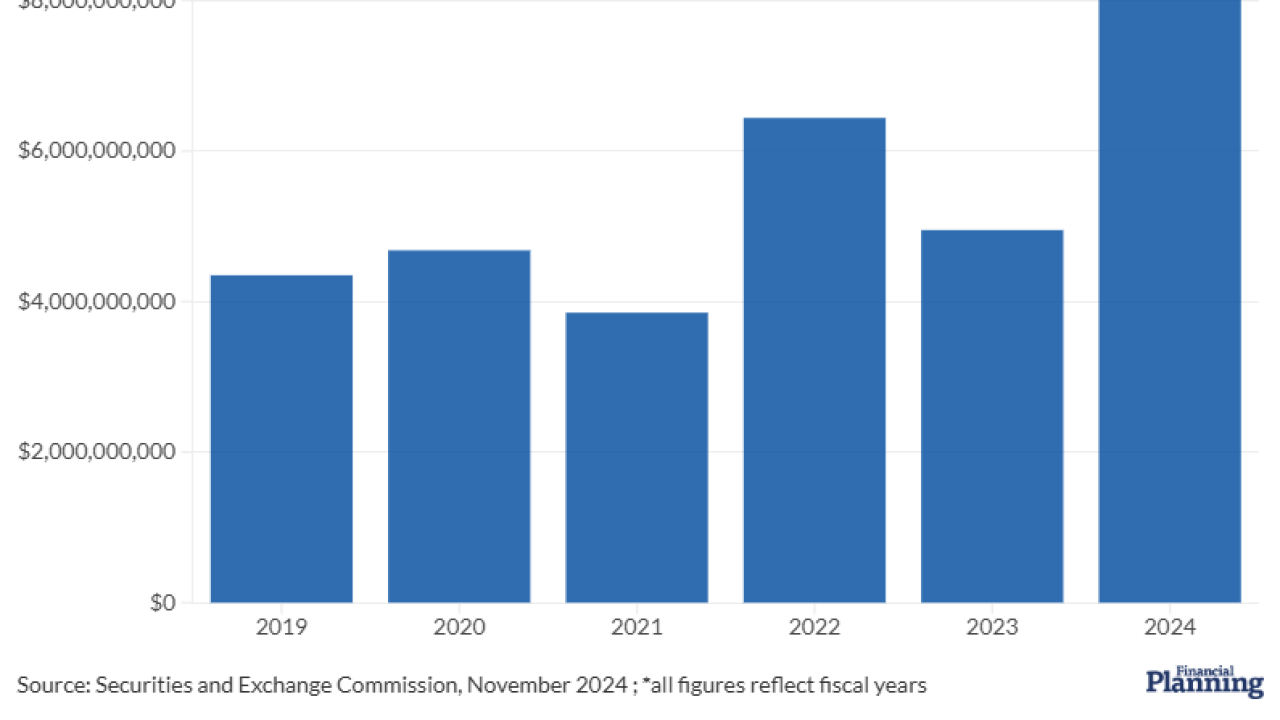Deals in wealth management involving digital advice platforms continue at a brisk pace, with several announced since the beginning of July involving funding, acquisitions and partnerships.
The latest is a tie-up announced Tuesday between Personal Capital and BancAlliance, a consortium of more than 200 community banks. The deal grants BancAlliance member banks a quick route to modernizing their online presence with access to Personal Capital's digital tools.
In turn, the hybrid advice provider can pitch its service to clients within the consortium, whose bank members cover 40 states and hold an average of $1.5 billion of assets.
Earlier, Baltimore-based asset management firm Legg Mason revealed it had taken an 82% stake in robo platform Financial Guard, in an effort to create an alternative avenue for distribution as well as shore up its ability to meet the requirements of the new DoL fiduciary rule.
Legg Mason's announcement came just days after national insurer TIAA, acquired MyVest, a San Francisco-based wealth management technology firm that assists broker-dealers and banks. Insurance firms including Transamerica provided $6.4 million in Series A funding to New York-based digital planning startup Everplans.
And Fidelity's eMoney brokered a deal with IBD Waddell & Reed to exclusively provide its advisers digital wealth planning tools through its emX Pro solution.
The activity at large is the result of a shift in thinking among wealth management firms, says William Boland, senior analyst at research firm Aite Group, who noted in a recent blog that every firm's strategy toward digital will have "a material impact on advisers’ service delivery, technology spend, business model, and, last but not least, brand."
A WIN FOR PERSONAL CAPITAL
For instance, Personal Capital's partnership with BancAlliance, Boland says, is a smart one, as it gives a direct boost to its customer acquisition effort.
"They are looking for means to get economies of scale, and instead of competing for clients on a one-to-one basis; they can work with an alliance and increase distribution. When you can get an institutional distribution, it's not just that relationship; it's all their employees and clients. It's a quick means of adding scale. It's a win."

There are a number of benefits for the banks too in the partnership, says Bill Winterberg, founder of FPPad.com. "If I'm already a customer of a community bank, then this addition of Personal Capital's dashboard is a great value-add benefit. Not only can I keep my relationship with my small, local bank, but I can also be the beneficiary of slick technology and account aggregation to solidify my relationship with the bank without taking my business elsewhere."
Bank advisers too will benefit from the opportunity to view a customer's total financial balance sheet aggregated in the Personal Capital dashboard, and then use that information to identify potential product opportunities, Winterberg adds.
There remains a question as to the extent that Personal Capital can monetize clients within BancAlliance's network, says Sean McDermott, senior analyst in consulting services at Corporate Insight.
"They have a $25,000 account minimum. Among the average customers at a community bank, outside of their 401(k), how many have such liquid assets to invest? It's tough to imagine there will be a ton of people who can meet that threshold."
A Personal Capital spokeswoman said that the platform would not be lowering its account minimums for clients coming from the BancAlliance network.
PRESSURES PUSHING DIGITAL
The announcements by Legg Mason and TIAA demonstrate asset managers and insurance firms are keen on making deals for automated advice primarily because they realize it is a new distribution model, McDermott says. "They need to capitalize on it to remain competitive moving forward in changing landscape."
But the shift to robos also is being spurred by a very human reality, he adds. "The traditional asset manager relies on human advisers as a distribution channel. What's happening now, and this has been widely discussed, is the average age of an adviser is 52. Basically, their current distribution model is relying on a human salesforce that's going to shrink."
Another motivation toward digital is the steady pressure on costs placed on managers by passive investing's popularity, notes Pamela DeBolt, associate director at research firm Cerulli.
"Fee pressure is a serious concern for mutual fund managers," DeBolt says. "They struggle with manufacturing a product that hits the appropriate fee point with competitive share class pricing and are concerned with being able to achieve scale to support lower operating expense ratios. We expect fee pressure to force firms to consolidate or eliminate products. This will create a focus on best of breed and will impact the distribution model."
An upside to the embrace of robos by asset managers, McDermott and Boland agree, is that digital platforms are easy solutions for U.S. firms eyeing overseas markets, where recent studies from E&Y and PwC show that there's greater receptiveness among HNW clients toward managing wealth primarily digitally.
"It's a savvy approach from an operational cost standpoint," McDermott says. "It's much easier to update website and tweak that make that compliant in Europe and Asia, then it would be to open an office."
SIGNIFICANT TRACTION
The value of digital platforms helped Everplans gain the funding it needs to expand, says Everplans co-founder and co-CEO Abby Schneiderman, who notes that her platform's retail userbase doubled in the past year, quadrupled in terms of the number of advisers on the Everplans Professional platform.
"We've had a significant amount of traction in our enterprise and retail offerings," Schneiderman says, declining to provide specific figures, but does note that the platform counts 100 firms as clients.
The new funding takes the pressure off the young end-of-life organizing platform, which now has to further develop its offering and expand its own staff, she says.
The platform's specific focus is the type of unique approach key to finding value in digital offerings, she adds.
"One of things advisers like about Everplans is that it goes into the nooks and crannies of people's lives, it's a conversation starter. It's about allowing the adviser to have another touch point, enabling them to act holistically and go the extra step."





